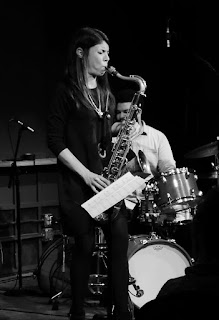At Jazz Kitchen, Melissa Aldana shows well-honed focus on tarot and personal insight
 |
| Melissa Aldana solos (backed by Abadey). |
Melissa Aldana is among the jazz musicians who have taken the lingering pandemic as the catalyst for new music to make up for the decline of working before the public. As often in normal times, going into the studio with the creative result has taken on special importance before going on tour.
The 31-year-old tenor saxophonist, a native of Chile, likes to base her compositions on cultural influences outside music. From "Visions," the Motema CD that first acquainted me with her music, she turned from visual art to the esoteric mysteries of tarot, a kind of playing card long regarded as a way to seek personal direction into the unknown.
The occult can be a spur to art regardless of a creator's depth of belief. Tarot weaves its way into T.S. Eliot's "The Waste Land," and occult knowledge had a long-lasting effect on W.B. Yeats' titanic poetic career.
For Aldana, "I took the lockdown as an opportunity to learn more about myself through the process of learning tarot," she explains in a program note to her new CD. Some of the tunes she wrote about the tarot's 27 major arcana are the unifying theme of "12 Stars," the musician's Blue Note recording debut. Touring on that album, Aldana headed a quartet Saturday night at the Jazz Kitchen.
The first set opened with the a revisit to her personal journey's outset. They are the same pair of compositions that launch "12 Stars." Clearly, "Falling" and "Intuition" are designed to mark the progress of reconstituting a life after the global blow of March 2020 and finding internal resources to apply to recovery.
As performed by Aldana here, with Mike Moreno on guitar, Pablo Menares on bass and Kush Abadey on drums, there was likely deliberate tentativeness about the first piece, and a little more "falling off" from some notes than is customary in the saxophonist's firmly centered playing. "Falling" made a good opener for a set, as it seems a way of getting used to the room and the audience.
The group's fitness for the gig and the music was hardly in doubt, however, even through the probing nature of the leader's playing in "Intuition." As a sign of gathering confidence, Moreno brought hints of funkiness into his solo, which was an apt touch. Aldana soon poured forth her admirable sound, always expressive and comfortably well-integrated, with no need for squeaks, squawks or split tones. That was particularly notable when she moved into the higher range, where she got what she needed out of reaching up and linking the heights to the central and deep parts of the tenor's compass.
When more high-register playing marked her playing in "The Bluest Eye," it was a tribute to the search for identity in Toni Morrison's novel of the same title. Surging energy from Abadey at the drums confirmed the nervous, skittery response to what Aldana calls society's indoctrination of maturing girls about beauty — the shaping theme of Morrison's story.
Especially impressive and for me the set's ensemble highlight was the ballad "Emilia," with its tonal variety (more chords from the guitarist and ringing reverberant accompaniment toward the end), as well as the set's only bass solo, a plangent, tidy statement by Menares.
Abadey's vigorous opening cadenza on "Los Ojos de Chile" helped put across Aldana's version of a protest song about conditions in her homeland. Nuance entered when the band joined in and stated the theme, but everyone subsequently stepped forward to underline the social-justice message. What sounded at first like the out-chorus led to further soloing, with an ensemble sound that remained vigorous and forceful till the end.
The combination of exuberance and control characterized the whole set. Aldana's engagement early in the club's observance of Jazz Appreciation Month deserves kudos.
[Photo by Rob Ambrose]



Comments
Post a Comment